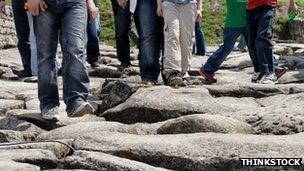Draft history curriculum 'list-like and too narrow'
- Published

Teachers may only be able to skim the surface of an "overloaded" draft history curriculum, claims a report
A draft history curriculum for England is "list-like", "prescriptive" and omits "the histories of Britons who are not white Anglo-Saxons", says a report.
The group, Curriculum for Cohesion, of teachers, academics and employers calls the draft "unteachable, unlearnable and un-British".
They warn that if adopted the curriculum may alienate pupils from ethnic and religious minority groups.
The government said its approach had the support of eminent historians.
Curriculum for Cohesion includes academics, religious leaders, teachers and employers. Its aim is to develop "humanities education to improve the lives of young people in the 21st Century".
Its welcomes aspects of the government's plans for a new national curriculum for history but says it needs significant changes.
'Sensible aims'
In particular it commends the emphasis on a chronological framework - but although the draft contains "some sensible aims... it is at once too narrow and too broad", author Matthew Wilkinson told BBC News.
"This was a golden opportunity for the government to develop a historically rich and forward-looking curriculum, but it has become a crass bit of backward-looking, ideological nation building."
The report says the draft is overloaded and not focused on what pupils really need to know about British history in each period, calling it "unteachable in the overwhelming quantity and detail that it will require teachers to teach".
"Either whole swathes of the curriculum will remain uncovered or teachers will skim the surface, leaving pupils with little remembered useful knowledge of Britain and very little affection for the subject of history."
The authors argue that the curriculum is over-prescriptive with a "list-like structure of topics with no differentiation in their complexity" which risks making it "unlearnable".
They fear that pupils will be presented with complex events and concepts before they are ready to understand them.
'Alienating minorities'
The authors, who include Muslim academics, also say that the plans ignore modern historical scholarship which stresses the interconnectedness of civilisations and nations.
They highlight the curriculum's omission of the contributions of troops from the British Empire on the Western Front and other campaigns of World Wars I and II, as well as a wider lack of acknowledgement of "the importance of Islamic civilisation to humanity's progress and history", for example to the Renaissance in Europe.
They warn that, as it stands, the new curriculum may alienate pupils from ethnic and religious minorities.
"It largely fails to acknowledge that Britain's diverse population is the product of our rich and diverse history and so it threatens to alienate the 17% black and minority ethnic population of English schools."
The authors say the curriculum needs to include the Muslim contribution to world history in order "to counter the types of historical narrative that are available on the internet" which encourage radicalisation among young Muslims and anti-Muslim prejudice among young white Britons.
They describe the draft as "un-British" in that, even at moments of national crisis and retrenchment, during for example two world wars, "governments always understood the need to keep the tradition of world history alive in schools and to have an emphasis on British history in the context of the world".
A spokeswoman for the Department for Education said: "Our approach to the history curriculum has been supported by some of the country's most eminent historians, including Professor Niall Ferguson, Professor David Starkey, Antony Beevor and Dr Amanda Foreman.
"Teaching the subject chronologically, rather than as a series of disjointed topics, will mean pupils understand how key events and people link to and follow one another, and where they sit in the context of Britain's rich story.
"It is nonsense to say the draft curriculum omits the histories of Britons who are not white Anglo-Saxons. Mary Seacole, the arrival in the UK of post-war migrants from the Caribbean and the immigration of East African Asians are all explicitly mentioned in our draft proposals."
A consultation on the national curriculum is due to end next week.
A booklet by three academics for the Politeia think-tank has backed the government's plans for the history curriculum. Prof David Abulafia of Cambridge University has dismissed suggestions that the draft curriculum is "jingoistic" because it focuses heavily on British history as "absurd". Speaking at an event to launch the booklet on Thursday, Prof Abulafia said children living in this country were surrounded by reminders of Britain's history and were being educated in the nation's school system: "It is right and proper that they should first of all have a fundamental grounding in the history of this country", he said.
- Published31 March 2013
- Published2 March 2013
- Published27 February 2013
- Published10 December 2012
- Published25 October 2012
- Published20 October 2012
- Published2 December 2011
- Published22 November 2011
- Published13 March 2011